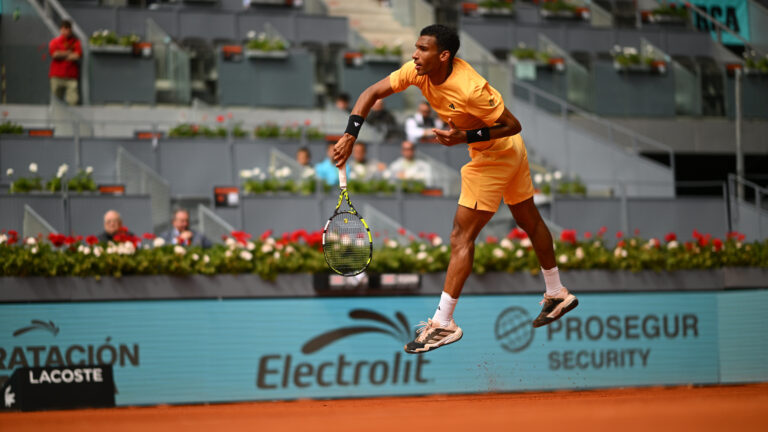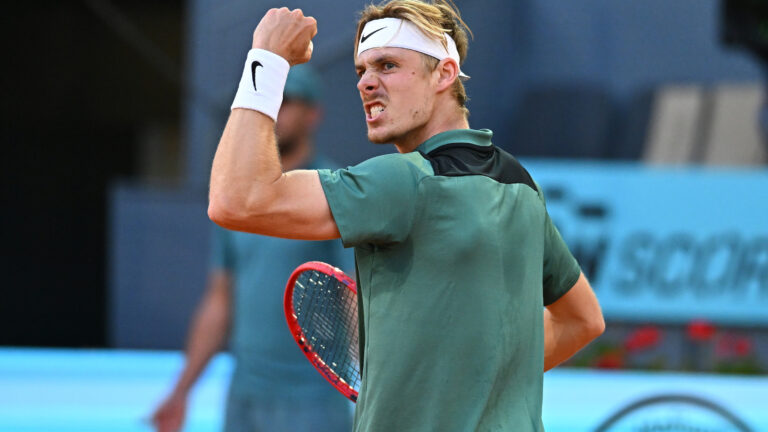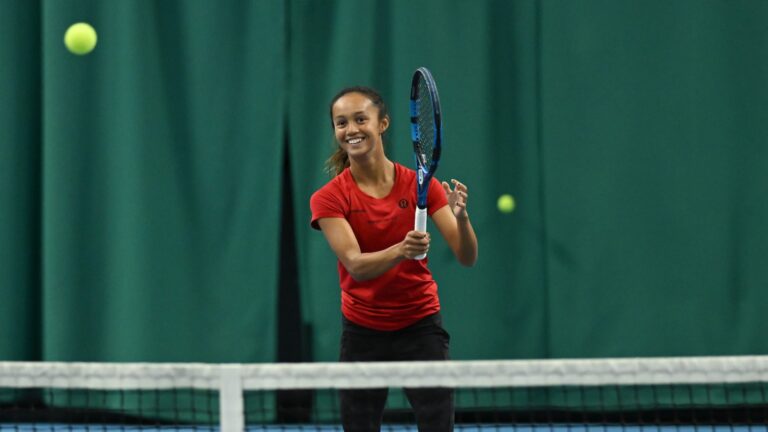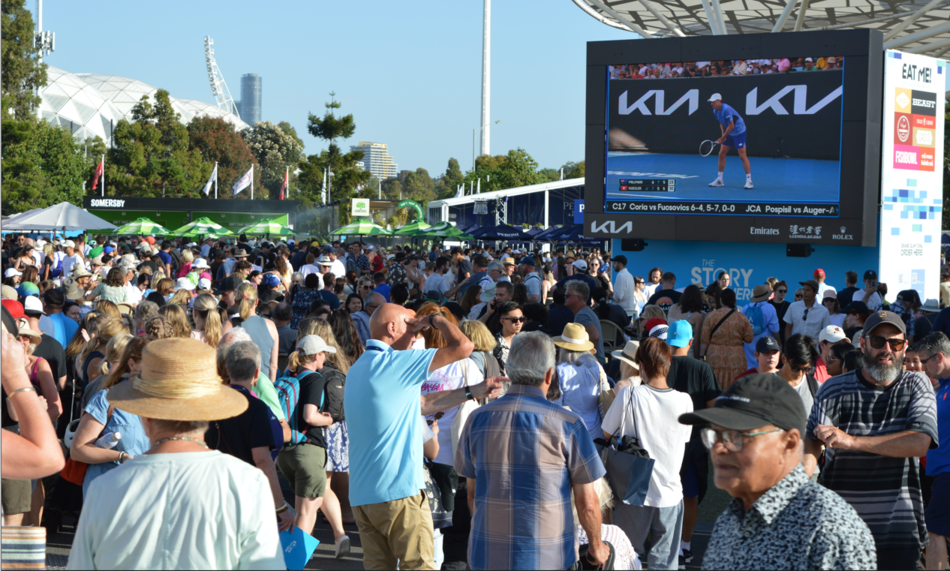
There were five Canadians in action on day one of the 2023 Australian Open – and the most esteemed trio are now safely into the second round.
In France they are called ‘Franco-Francais” and in Canada we might use the term “Canado – Canadian’ when two players from this country face each other. That was the case with the most significant match-up for Canadians on Monday’s schedule as No. 6 seed Félix Auger-Aliassime needed to overcome a spirited effort by compatriot Vasek Pospisil – winning 1-6, 7-6(4), 7-6(3), 6-3 in three hours and 58 minutes.
In other action, Denis Shapovalov’s 6-4, 4-6, 6-4, 6-1 win over Dusan Lajovic had a few dicey moments, certainly more than Bianca Andreescu in her impressive and expeditious 6-2, 6-4 victory over No. 26 seed Marie Bouzkova.
Also on court on Monday, Rebecca Marino met her match on the day as she was beaten 6-2, 6-4 by No. 87 Zhu Lin of China.
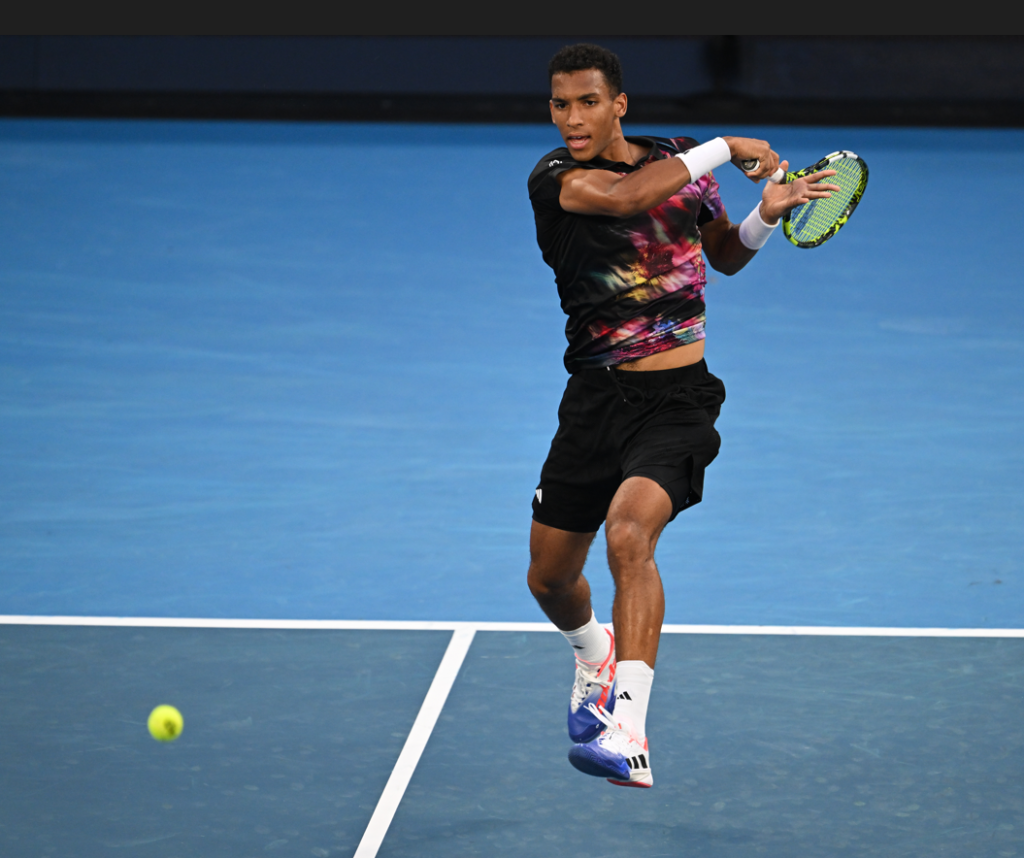
It was a shocker to see the scoreboard in John Cain Arena at 5-0 after 26 minutes of the Auger-Aliassime – Pospisil match. “It went so quick that I was down 4-0 [5-0],” said Auger-Aliassime. “It’s tough to explain but then I just had to stay positive to be able to bounce back in the second set.”
Expanding on that, he said, “I knew was playing below my level. I wasn’t worried because it’s a long match, and I knew if I corrected a few things, with my serve and my forehand, things would get better.”
They did but not as swiftly as he would have liked. In both the second and third sets he was up a service break only to lose them and have to eventually win the set in a tiebreak. “It’s too bad I had to go to a tiebreak in the second and third sets,” he said, “on another day I think I could do better. On a better day when I’m playing my best tennis I wouldn’t find myself in those tiebreaks. But I’m happy I was able to play well when I had to.”
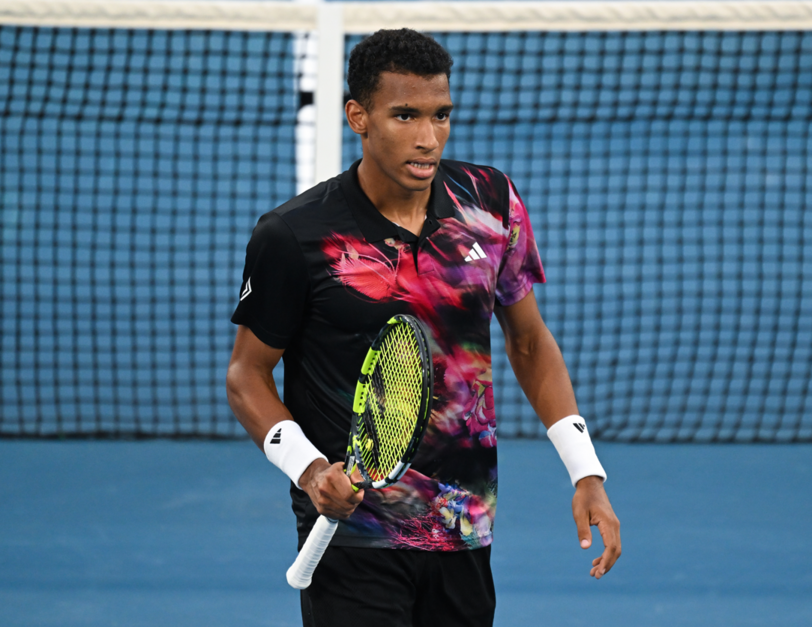
About how much he could actually enjoy the match, he added, “it’s true that at certain times in the third set it wasn’t pleasant. There were so few rallies and I hit so few balls that when I had to play a rally I’d miss right away. As a player, you don’t have your bearings. Vasek served well and shortened the points. Then I served and the points didn’t play out. So it was hard to enjoy it. But in the fourth set I felt much better – to finish like that was in the right direction. If I can keep that same dynamic, I think it will be better for the next rounds.”
Auger-Aliassime also said that being a compatriot and friend of Pospisil’s did not play into the match but that he did have trouble playing him once he noticed in the third set that his Davis Cup teammate was ailing (with cramps) because an opponent going for broke on his shots is unpredictable and difficult to anticipate.
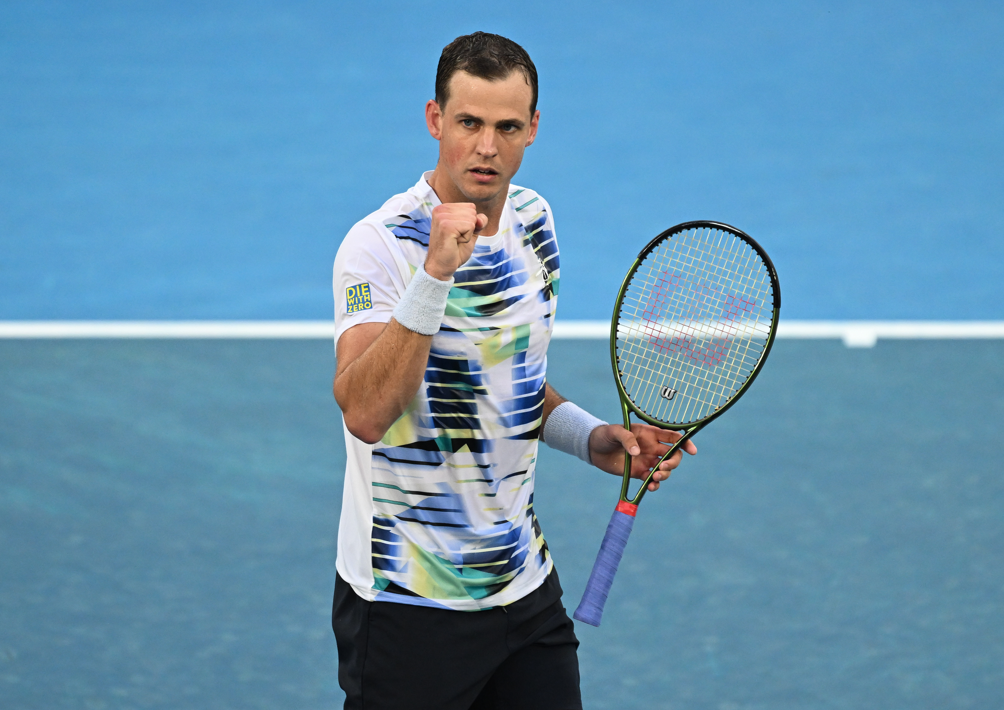
Pospisil was bitterly disappointed following the loss. “From my perspective it was purely physical,” he said about the outcome. “I would like to have done things better and I feel I was playing good enough. I sweated through nine shirts today. And when you start cramping at 5-4 in the second set, it’s not going to help your chances. It cooled down quite a bit there in the third set which kind of gave me a second wind (although it wasn’t an excessively hot day). But at that point my legs were kind of shot already. This is something I have to sort out. I’m working hard, I’m working through it. It’s disappointing to me to lose from something that’s not tennis related.
“It would be a lot easier to accept if I felt that somebody just played better. That’s a lot easier than something like today, even though Félix played great. I don’t want to take anything away from him. He’s a good friend of mine and he’s a Top 10 player. But at one point it gets a bit frustrating. I’m 32 years old and I’ve been dealing with a lot. I don’t feel like my tennis is inferior to these guys who are Top 10, Top 20 – not at all. I feel like historically the majority of times when I lose these matches it is something physical. Their level of fitness is extraordinary and it’s not because they work harder than me.”
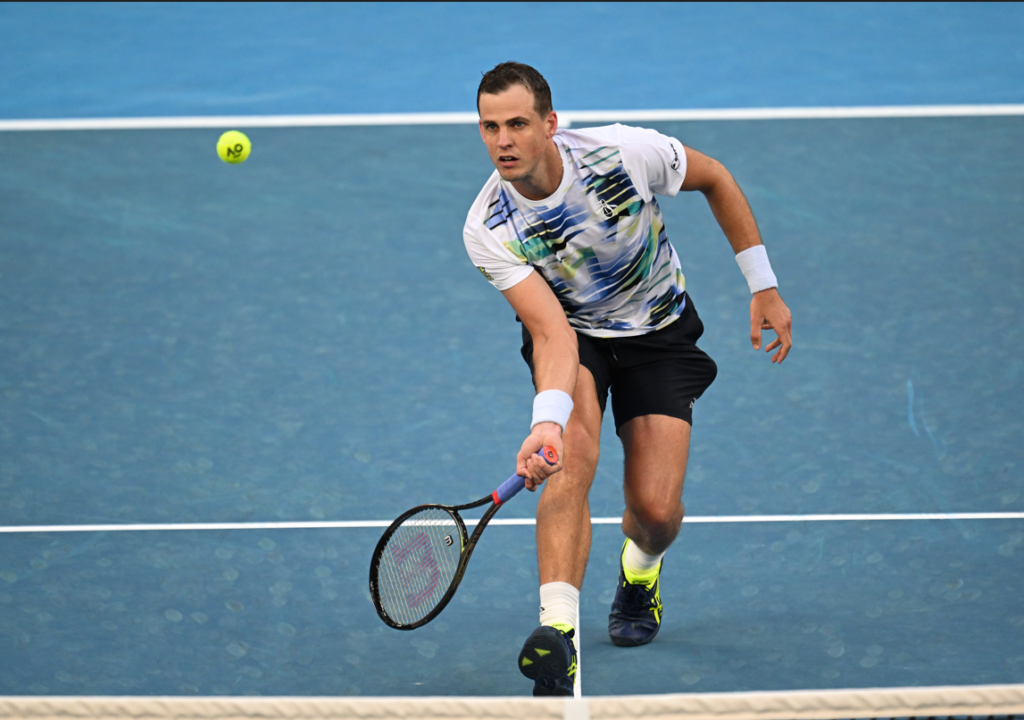
Partly skewed by the one-sided first set, Pospisil’s numbers were excellent– his winners to unforced errors ratio was 46/45 to Auger-Aliassime’s 31/36 and his rate of converting break points was 4/5 compared to 3/12 for Auger-Aliassime.
Pospisil has been working with a new coach, former player Malik Jaziri from Tunisia, and plans to play a Challenger event in Quimper, France next week.
As for Auger-Aliassime, he’ll face No. 53-ranked Alex Molcan. He lost 6-4, 2-6, 7-6(7) to the 25-year-old Slovak after having a match point on clay in Marrakech last April. But he claims to have learned lessons that will be valuable in their second round on Wednesday.
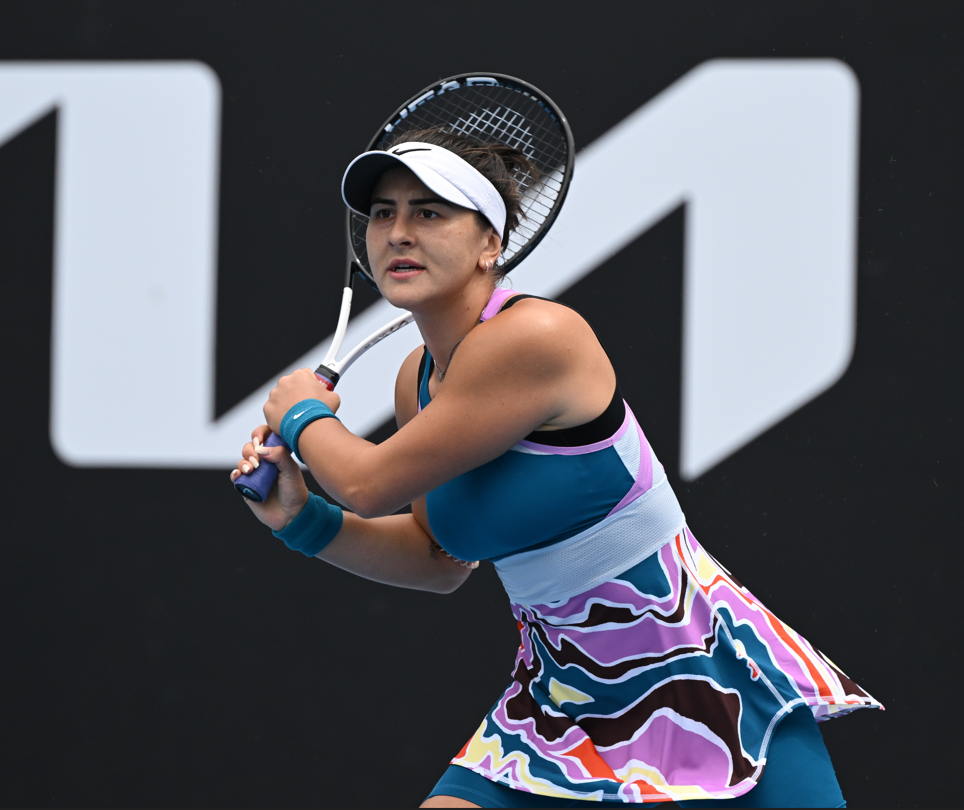
Andreescu was fast out of the gate on Monday, especially hitting her cross-court backhand with velocity and vicious angles. She broke serve to 3-1, held to 4-1 and soon wrapped up the opening set 6-2 in 46 minutes.
There was a brief moment of concern in the second set when Bouzkova had double break point at 3-3. But Andreescu saved them with a service winner and an unforced error from the 25th seed. She was back playing well and salted away the match four games later when the 24-year-old Czech seemed to finally falter under the pressure of the Andreescu onslaught – making three errors to end the match.
“It was kind of just very level throughout the whole match,” Andreescu said of her performance on Court 3 in comfortable climatic conditions. “There weren’t any ups and downs, which can kind of happen in my matches. So I’m just very, very happy with how it (23 winners, 13 unforced errors and never losing serve) turned out.”
Although she was vague about whether she knows that top seed Iga Swiatek could possibly be lurking in the third round, one senses she does and is not overly apprehensive.
“I’ve worked really, really hard, and I know what I’m capable of,” Andreescu said. “So looking at Iga, someone like her, it’s very motivating and inspiring because, I mean, it’s something hard to do in tennis to be consistent like that. So I definitely condone (respect?) her.
“It definitely motivates me, and like I said, I know I can be back in that position like I was in 2019 and hopefully even better.”
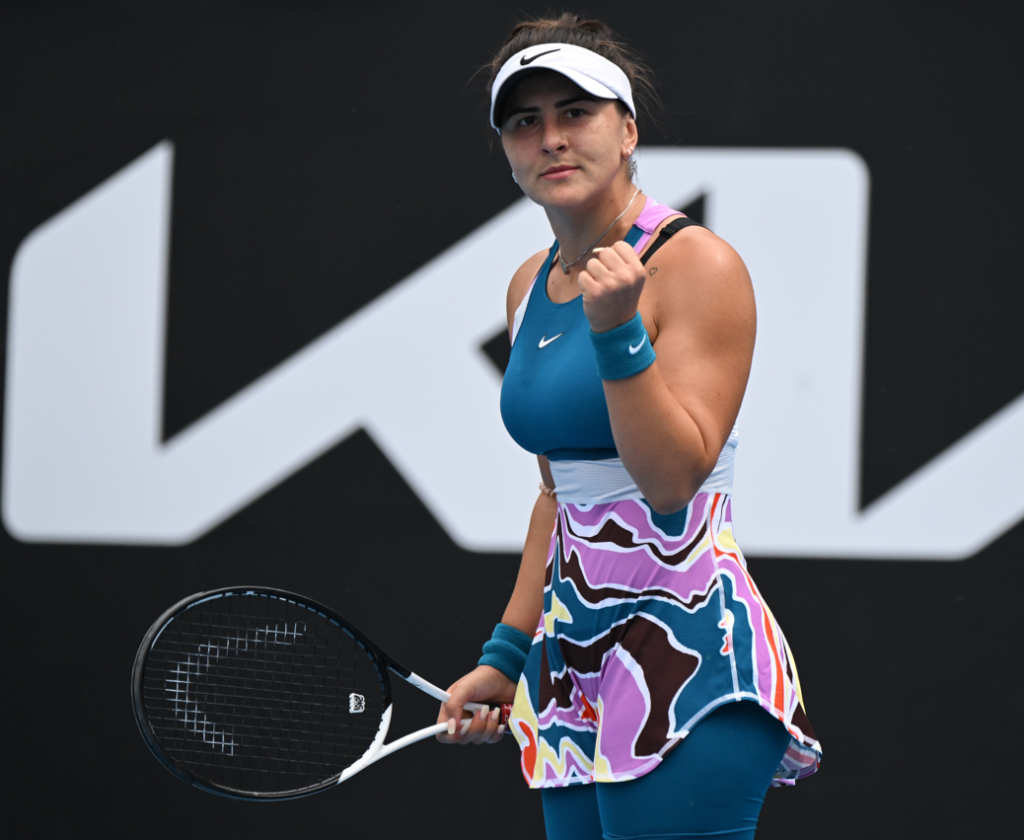
She’s comfortable with her new coach Christophe Lambert, a Frenchman who worked with her as a junior and also for Tennis Canada in Toronto, Halifax and Vancouver and recently left his positon as high-performance director with Tennis New Zealand.
Lambert, whose wife is a New Zealander and who still lives there, has an outgoing personality with a folksy charm. He spoke about Andreescu losing 12 games in a row after leading 4-0 in her second match against in Adelaide two weeks ago against Veronika Kudermetova. “What’s strange is if you look at it,” he said, “you can either say she played four first games that were exceptional, or the next 12 games when she was pretty close. She made the right decisions but she was taking too many risks. And because she had just started playing tournaments again – she just had the previous round against (Garbine) Muguruza. Prior to that it was three months and the exhibition in Dubai (in December) didn’t really do much. She was close – two or three centimeters – and she tried too hard, wanted to win so much. So when you look at it, it’s 12 games and that’s a lot. But what’s good with Bianca is I think she’s really matured in the last year. She told us, maybe a year ago she would have stayed in her room and not wanted to talk to anyone.
“And there we went right back to the hotel she had her treatments. I went and sat on the couch and we talked about everything – not just of the match. And the next day she was on the court. So she’s maturing and even for me I was there counting the games, one, two, three, four…maybe she’ll win one in the second set but no, it continues. And in the end you realize it’s 12 games. Everybody was asking us what happened. I said I didn’t know because I wasn’t in her head. I think it’s the surprises you can have with players of a high level. She could have easily lost the match before against Muguruza – trailing 6-3, 5-2 – and then we wouldn’t have talked about it. With Bianca you never know, but you know she has a huge talent and a desire to do well. I hope we’re going to go far with her. We’ve put everything in place to do that.”
That includes experienced physio Jean-Pierre Bruyere, also a Frenchman, who has previously worked with Lambert.
“Christophe is great,” Andreescu said. “He’s hilarious. Also Jean-Pierre, they’ve known each or for, like, 30, 35 years. So the communication is really good, and that’s really what I want in a team. And they make everything kind of relaxed and laid-back because tennis can be very stressful.”
In the next round, Andreescu will face No. 100-ranked qualifier Cristina Bucsa of Spain. “I’ve watched some of her matches,” Andreescu said. “She’s a grinder. I know she gets to a lot of balls. She’s a fighter out there, and I’m definitely going to do some more investigating tonight and tomorrow with my coach.”
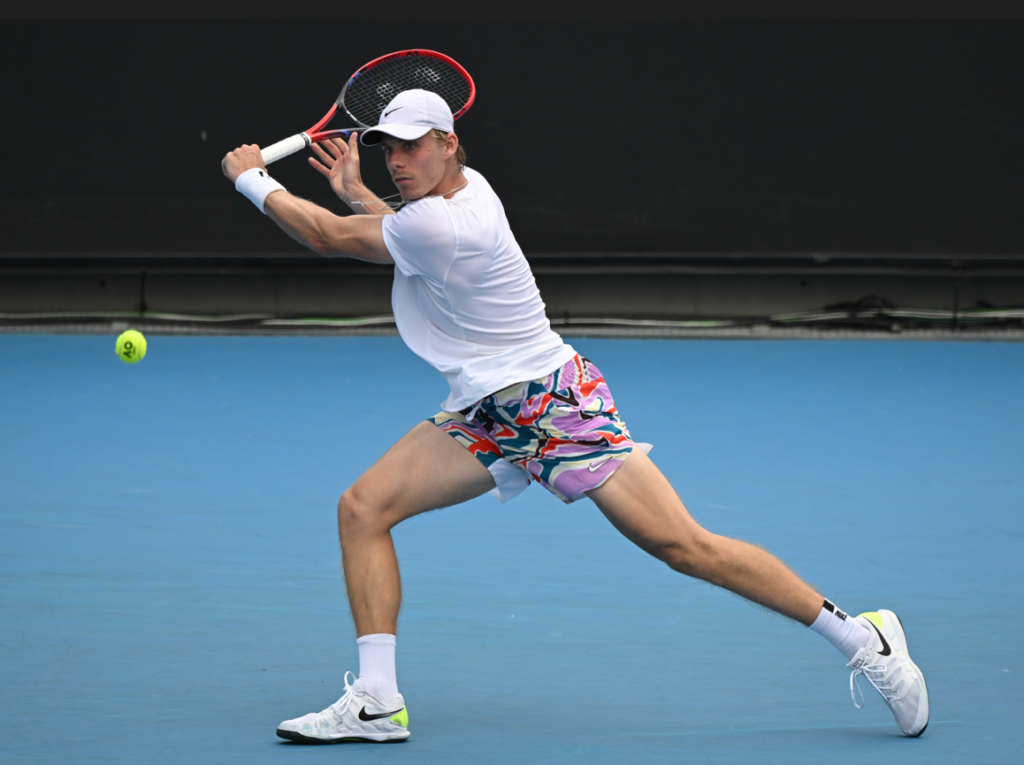
Shapovalov had his ups and downs in his match with No. 86-ranked Dusan Lajovic but pulled through with a four-set victory. The 20th seeded Canadian trailed 3-1in the third set but broke back to 3-all and then soon was hitting a coup de grace big backhand service return winner on set point. The fourth set was more of the ‘flying Denis’ show and lasted only 27 minutes.
“I think the first two-and-a-half sets the level and the intensity was very high, and I started to notice that he maybe dropped five, ten per cent with his energy and (I) just tried to take advantage of that.”
How does it feel to be on the other side of the net from Shapovalov when he’s just exploding winners, 52 to go with 39 unforced errors in the 1573 Arena match in front of a substantial number of Shapovalov partisans in the crowd?
“It’s not fun, there’s not a lot of rhythm,” explained the 32-year-old Lajovic. “When you don’t have a lot of rhythm, those pressure moments feel bigger than they are – especially in the first set being down 5-4 I felt a little bit more pressure when he started putting balls in. When he’s on, he’s probably one of the guys that can go deep in a Slam.”
What’s different about Shapovalov’s game compared to other players? “I think just being a lefty is very difficult,” said the Serb. “He’s got big swings and he’s rotating his shoulders pretty much more than other players. It’s hard to see where he’s hitting the ball. Then if you’re split second late in moving toward the ball, it always difficult. That’s the most tricky part about him.”
In Wednesday’s second round Shapovalov will face No. 94-ranked Taro Daniel. The current world No. 22 is 2-0 against the Japanese, having defeated him without losing a set in Dubai in 2022 and at the 2019 Australian Open.
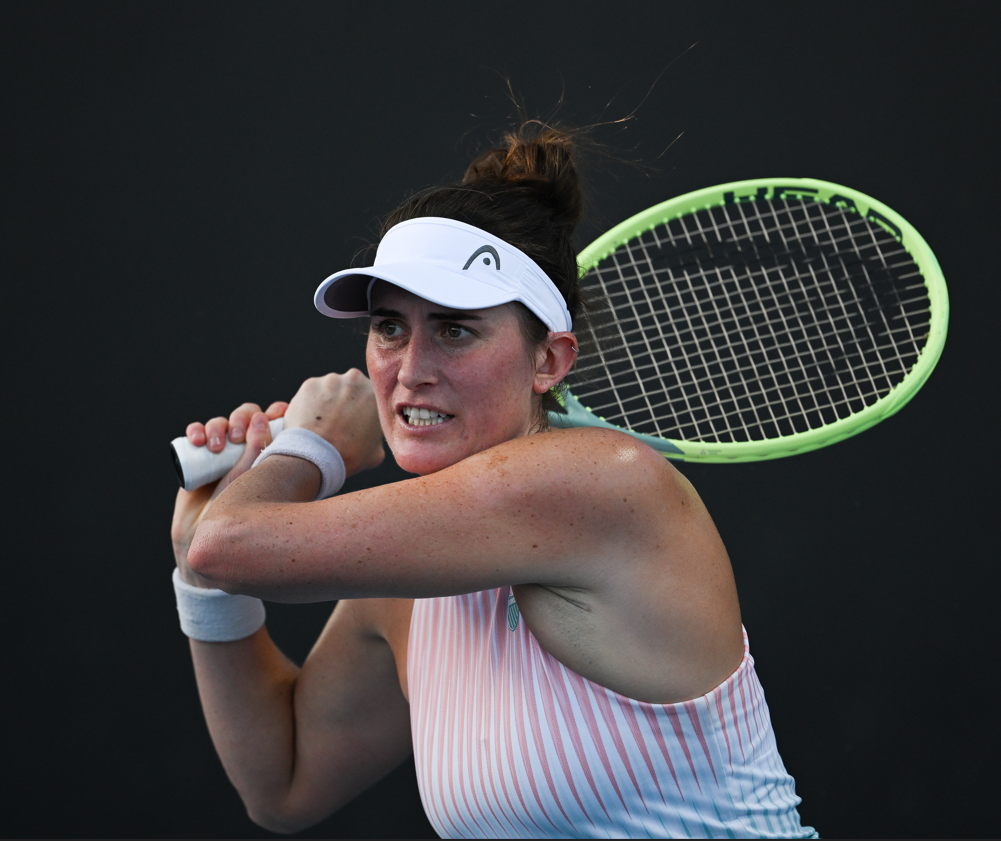
Rebecca Marino joined Pospisil as the other Canadian to lose on day one. She was basically outplayed by Zhu. They had split two meetings in 2022 but this time Zhu kept the pressure on Marino off the ground and never gave her a chance to impose her power game – on serve or via her potent forehand.
“She played a lot cleaner and better than me and handled the noise and conditions (on Court 14) a lot better as well,” Marino said. “I felt that the ball was coming so fast it was hard for me to dictate the points. She was controlling and that’s why I was more on the run than usual because I wasn’t as able to control the points as she was. She was taking time away from me quite effectively.”
The numbers tell some of the story – the 28-year-old Zhu’s winners to unforced errors was 15/12 while Marino was 12/21.
It was not Marino’s best serving day – her first serve percentage was only 56 and she won only 52 per cent of first-serve points. Almost shockingly, she served not a single ace in the one hour and six-minute match.
“I’m not in qualifying anymore so this is a step up and I have to learn this level and attempt to thrive at this level,” said the No. 67-ranked Marino summing up her three 2023 tournaments (1-3) in Australia – Auckland, Hobart and the Open. “It’s getting used to being here. People know who I am again, so I’m not really a mystery with my game-style either.”
